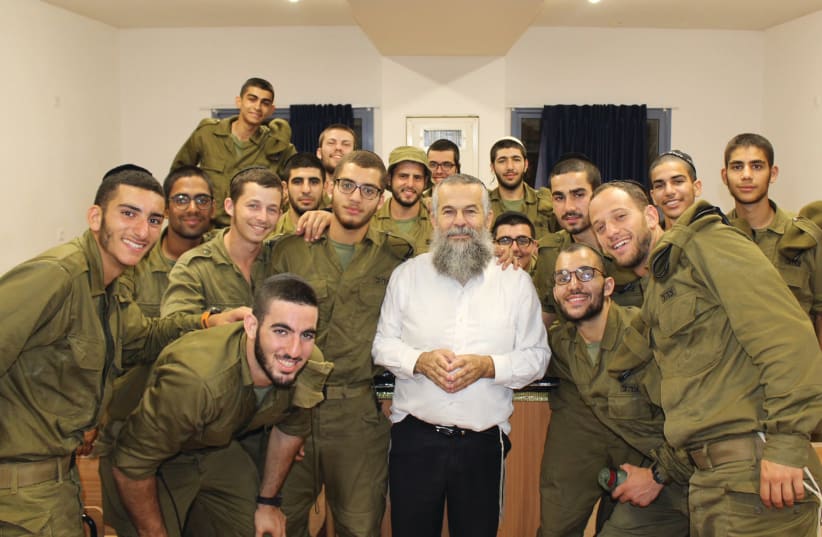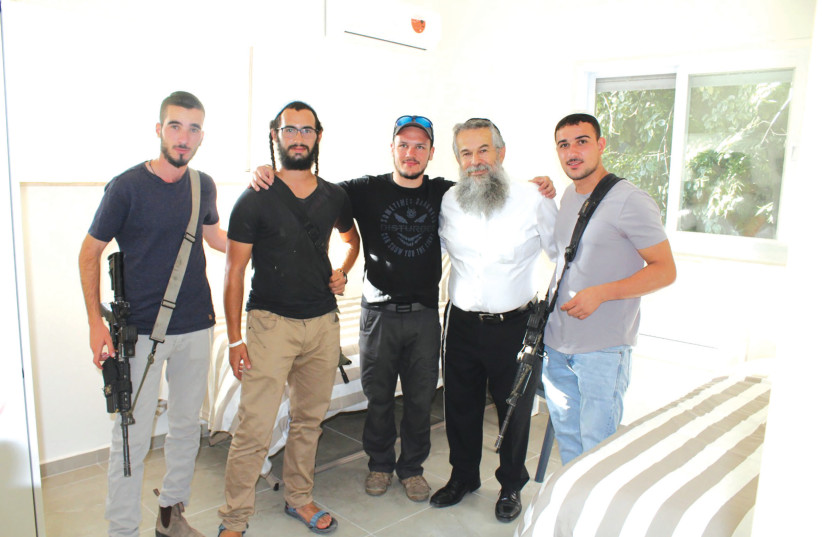“Rome was not built in a day,” says Rabbi Shalom Myers of Jerusalem describing a personal journey that began eight years ago helping English-speaking lone soldiers from abroad to more recently widening the ambit to include Hebrew-speaking Israeli soldiers from the haredi (ultra-Orthodox) community.
However, “we are well on our way,” Myers affirms enthusiastically of his groundbreaking vision.
There was a particular resonance in the rabbi’s use of the word “Rome,” which had begun the Jewish exile from the Land of Israel 2,000 years earlier, and which Myers is working to ensure will never happen again as he helps lone soldiers in the IDF protect and preserve the hard-fought Jewish state of Israel.
“Never again” means doing not only talking – and Myers exemplifies both. He had just returned with his architect wife, Lynne – “my partner” in his Emek Lone Soldiers initiative – from an Ikea outlet with a truckload of furnishings “for our apartment in Jerusalem for the haredi lone soldiers.”
The apartment houses six soldiers, “three Israelis and three from abroad, two of whom are from orthodox communities in the US.” Describing as “our pilot,” Myers hopes to have apartments “for 30 plus [soldiers] by the end of 2021” but in the near future to have a home-away-from-home complex “exclusively for haredi soldiers.”
A “lone soldier” is a soldier in the IDF with no family in Israel to support them. This could mean a new immigrant, a volunteer from abroad, an orphan or an individual from a broken home. Highly motivated to serve in the Israeli army, most lone soldiers are placed in combat units. At any given time, these soldiers are guarding Israel’s borders by land, air and sea.
While regular soldiers regularly spend weekends and holidays at home where their parents provide for all of their needs such as food, laundry and a hug, “these basics” are absent for a lone soldier when they leave a base.
There are more than 7,000 lone soldiers currently serving in the IDF, of which about 45% are new immigrants, coming from Jewish communities all over the world. Another 50% are Israelis who are orphans or that come from low socioeconomic backgrounds. And then there are those that come from ultra-Orthodox neighborhoods who are shunned by their families and communities because they decided to go to the army. Of the total, there are up to 1,000 English-speaking religious lone soldiers serving annually in various units of the IDF. They come from America, England, Canada, Australia and South Africa. Most have no immediate family in Israel and no place to call home.
This is where the Emek Lone Soldiers’s “Home-away-from-home” framework for religious lone soldiers wanting to maintain their religious lifestyle while serving in the IDF came in eight years ago with Myers leading the proverbial charge. The Emek Lone Soldiers is an off-shoot of the flourishing Emek Learning Center in Emek Refaim, the German Colony’s main street, co-founded and headed by Myers. So what began years earlier providing for English-speaking lone soldiers has in recent years expanded to embrace the haredi community. Myers – who has had four sons serve in combat units in the IDF – explains:
“They are all our children, all our soldiers – I make no distinction.” It is the beit midrash, the synagogue and “our community” that are “our three pillars that we offer to the religious lone soldiers,” he says.
“It takes a village to raise a child” reminds Myers of the African proverb that means that an entire community of people must provide for and interact positively with children for those children to experience and grow in a safe and healthy environment.
A child himself of Africa, Myers is familiar with the military. Formerly of Cape Town, where he was the reverend of Rondebosch and Parow synagogues, a chazzan at the Claremont shul, he was also a chaplain in the South African army as part of his compulsory military service.
Myers recalls when as army chaplain for Western Province Command, the Christian chaplain was suddenly unable to deliver his weekly sermon to the men on parade and “suddenly, I was called upon to fill in”.
“I’m the Jewish chaplain,” I answered. “Besides, I’m unprepared.”
“Maak nie saak nie (“makes no difference” in Afrikaans), Myers, proceed,” barked his superior.
Officer Myers looked out at the sea of men standing before him, and the words flowed. Afterwards, the officer congratulated him on the most inspiring sermon he had ever heard and his stature in the military henceforth was rock solid. “The point is,” he asserts, “You need to be prepared not only with knowledge but the confidence to impart that knowledge when you might least be expected to.”
Such attributes are serving him well today as he pursues his vision.
Asking what inspired him in this direction, Myers replies:
“Let me say this. When you get involved in the Rabbinate and you want to teach, influence and help – this is the ultimate hessed.” And in helping the lone soldiers, “not only are we helping individuals but we are helping the Jewish people.”
I was reminded of Rabbi Joseph B. Soloveitchik, who was very meticulous and stringent in every phase of the laws of prayer. However, when once visited by a student serving in the IDF and asked by the soldier in a tank division that involved cleaning and maintaining the tanks whether he needed to change his uniform when covered in oil and grime before praying the afternoon service, the rabbi looked at him in amazement and said out loud:
“Why would you need to change? You are wearing bigdei kodesh – holy clothes!”
Myers’s pursuit has not come without opposition from within his community. The following exchange is instructive. He recalls some years ago a well-meaning friend cautioning him:
“You should choose, either focus on the shul (synagogue) or the lone soldiers; you can’t do both.”
Capable of doing both and much more, Shalom is also a former practicing accountant, has Smicha from Machon Ariel and taught for 14 years at Ohr Somayach, heading the mechina program before founding the Emek Learning Center in 2013.
So while there was no need “to choose,” Myers is quick to add that had he had to choose, “I would have chosen the lone soldiers because while the learning center could be done by others, what I am offering the lone soldiers particularly now with the haredi lone soldiers is unique.” Of all the soldiers, the ones “closest to my heart,” says Myers are the haredi Israelis.
Why?
“They were not brought up from this; it is not their world and they are giving to their people but at a huge personal price; they have to start their lives all over again. They are the most in need, not only in preparing then for the army and offering them a warm environment during their military service but most important helping them after the army service in guiding them to then study to provide a financially sustainable future. Feeling abandoned, we are like their new parents.”
It’s a long and hard process but it is a fruitful process with huge rewards not only for individuals but for Israeli society.
Myers could not have received a more enriching endorsement for his vision then from the late Rabbi Lord Jonathan Sacks, who expressed the following in 2018:
“One of the core ideas within Judaism is contained in the famous Talmudic phrase: Kol Yisrael arevim zeh lazeh, meaning all of Israel are responsible for each other. This is at the heart of the mission and work of the Emek Lone Soldiers Initiative. By caring and looking out for those who have no other support, we are taking responsibility for them in the most Jewish of ways. Linking this work to the writing of a Sefer Torah is a beautiful idea. We know that for a Sefer Torah to be kosher, every letter has to be correct, and no letter, word or phrase is more important than any other. Such is the same with the soldiers who risk their lives in defense of the State of Israel. Each soldier has put himself or herself on the line and as such we, as Am Yisrael, must do everything possible to ensure they are looked after both during and after their service. I wish all at Emek Lone Soldiers, blessings and best wishes for the future.”
Trained for the temporal world with a lifelong passion for the spiritual – “I was born in a shul” – Myers’s journey has been one of absorbing and processing experiences along the way that “has served as my GPS” directing him precisely to his present destination - founding and heading first the Emek Learning Center and now the Emek Lone Soldiers.
May he continue his outstanding service to his community, the state of Israel and today and tomorrow’s lone soldiers.
I am very proud that when I stood under a chuppah 39 years ago with my wife, Hilary, the rabbi officiating was Myers!
The author is editor of the Hilton Israel Magazine, Inbal Jerusalem Magazine and cofounder and editor of Lay Of The Land, an online multimedia platform covering the Middle East, Africa and the Jewish world and can be followed on https://layoftheland.online, where this article first appeared.

